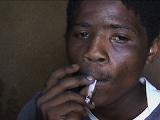Autistic children struggle to get and education

 This is the Johannesburg hospital school, children’s disability centre, one of very few schools in the country which caters for autistic children. According to recent statistics; one in every 110 children in South Africa is born with autism.
This is the Johannesburg hospital school, children’s disability centre, one of very few schools in the country which caters for autistic children. According to recent statistics; one in every 110 children in South Africa is born with autism.
Autism is an invisible disability. People very often judge children with autism as being naughty or as being defiant and its not. It is because of their inability to understand social rules that we very often just accept.
People with autism have difficulty interacting with others, communicating, their senses are sometimes impaired and they have a rigid way of thinking.
Children who don’t have autism can develop simple basic skills that allow them to learn, like the ability to sit, listen or focus their attention.
Children with autism don’t have these skills as part of their development. These are skills that have to be taught directly to children with autism before they can start formal learning.
It is extremely important that these kids receive early intervention. We believe we can start at the age of three to start teaching these skills to our children.
However some of these children may never be able to read, write or communicate. But here they can learn basic everyday skills that will give them a certain level of independence’¦ and for them and their families, these small simple achievements can change their lives.
We want our kids to be functional. We want them to learn skills that have meaning. A child that is able to write but is not able to bath themselves doesn’t really make sense. You don’t want to bath an 18 year old. So we focus on everyday lifeskills.
We teach them to dress and undress, to wash their hands, to use the toilet. We teach them these skills that we all take for granted.
Unfortunately, autism is an expensive disability to overcome. One autistic child needs the same amount of attention as six neuro-typical or normal children.
Children with autism requires a whole lot more attention and a lot more specific intervention. And one autistic child is equal to 6 neuro-typical children. So in a class where a teacher has 8 autistic kids, the teacher is working with 48 neurotypical kids. And that is costly. Our biggest expense is having enough people to work with the kids in these small groups.
These children are the lucky ones. Most can’t get into schools like this. An estimated 135 000 autistic children in South Africa aren’t getting the specialised education they need.
A lot of these kids are kept at home, are hidden away from society and they don’t benefit at all. That parents are frustrated. That families don’t know what to do, where to go.
I believe that every child has the right to an education. And it should be no different for children with autism. And that is something that we need desperately in our country.
Republish this article
This work is licensed under a Creative Commons Attribution-NoDerivatives 4.0 International License.
Unless otherwise noted, you can republish our articles for free under a Creative Commons license. Here’s what you need to know:
You have to credit Health-e News. In the byline, we prefer “Author Name, Publication.” At the top of the text of your story, include a line that reads: “This story was originally published by Health-e News.” You must link the word “Health-e News” to the original URL of the story.
You must include all of the links from our story, including our newsletter sign up link.
If you use canonical metadata, please use the Health-e News URL. For more information about canonical metadata, click here.
You can’t edit our material, except to reflect relative changes in time, location and editorial style. (For example, “yesterday” can be changed to “last week”)
You have no rights to sell, license, syndicate, or otherwise represent yourself as the authorized owner of our material to any third parties. This means that you cannot actively publish or submit our work for syndication to third party platforms or apps like Apple News or Google News. Health-e News understands that publishers cannot fully control when certain third parties automatically summarise or crawl content from publishers’ own sites.
You can’t republish our material wholesale, or automatically; you need to select stories to be republished individually.
If you share republished stories on social media, we’d appreciate being tagged in your posts. You can find us on Twitter @HealthENews, Instagram @healthenews, and Facebook Health-e News Service.
You can grab HTML code for our stories easily. Click on the Creative Commons logo on our stories. You’ll find it with the other share buttons.
If you have any other questions, contact info@health-e.org.za.
Autistic children struggle to get and education
by sashawalessmith, Health-e News
August 23, 2010



